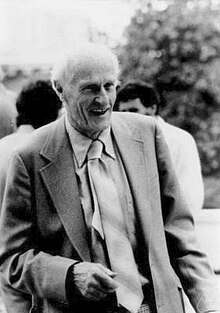Stephen Cole Kleene
Stephen Cole Kleene (born January 5, 1909 in Hartford , Connecticut , † January 25, 1994 in Madison , Wisconsin ) was an American mathematician and logician . He is considered to be one of the founders of theoretical computer science , especially of formal languages and automata theory (see for example Kleene's envelope , lambda calculus , Kleene 's fixed point theorem , Kleene's normal form , regular expression ).
Kleene grew up on his grandfather's farm in Maine (which he later took over) and studied at Amherst College (graduating in 1930 "summa cum laude"). In 1934 he received his doctorate from Princeton University with Alonzo Church with "A Theory of Positive Integers in Formal Logic". After brief teaching at Princeton, he went to the University of Wisconsin at Madison in 1934 , where he became assistant professor in 1937 and professor in 1948, and remained there until his retirement in 1979. From 1942 to 1946 he was an officer in the US Navy .
Like his teacher Church, Kleene contributed to the development of the theory of recursive functions, which was formalized by Church in his lambda calculus (later used in the Lisp programming language ). In his dissertation, Kleene examined in particular Church's claim that his lambda calculus provides all "computable" functions, examining more general recursive functions for which he proved a normal form theorem. He found several levels of predictability such as B. with partially recursive functions. He also introduced an "arithmetic hierarchy" and a "hyperarithmetic hierarchy" for predicates. In 1938 he published a specialist article on the three-valued logic system K3 he had developed . In 1954 he wrote a thesis with Emil Post on the degree of unsolvability of mathematical problems.
Since a stay at the Rand Corporation in 1951, he was also interested in automata, where he wrote an influential report in which he combined ideas from John von Neumann about calculating machines with those from Warren McCulloch and Walter Pitts (1949) about neural networks .
Kleene was also a leading exponent of the intuitionism founded by Luitzen Egbertus Jan Brouwer in the USA . In 1950 he spent as a Guggenheim Fellow in Amsterdam to study Brouwer's ideas with his students. Kleene wrote two widely used textbooks on mathematical logic and metamathematics , in which he also gave a clear formulation of Gödel's theorem .
In 1983 he received the Leroy P. Steele Prize . In 1969 he became a member of the National Academy of Sciences . In 1980 he was accepted into the American Academy of Arts and Sciences . In 1990 he received the National Medal of Science . In 1958 he gave a plenary lecture at the International Congress of Mathematicians in Edinburgh ( Mathematical Logic: Constructive and non-constructive operations ) and in 1950 he was an Invited Speaker at the ICM in Cambridge (Massachusetts) ( Recursive functions and intuitionistic mathematics ).
Kleene was an experienced mountaineer . He was married twice and had four children from his first marriage (from 1942).
Fonts
- On notation for ordinal numbers. In: The Journal Symbolic Logic 3, No. 4, pp. 150-155. 1938.
- Introduction to Metamathematics . 1952.
- Mathematical Logic . Wiley, New York 1967.
- with Richard Eugene Vesley : The Foundations of Intuitionistic Mathematics - Especially in Relation to Recursive Functions . North Holland, 1965.
- Kleene General recursive functions of natural numbers , Mathematische Annalen, Vol. 112, 1936, pp. 727-742
Web links
- John J. O'Connor, Edmund F. Robertson : Stephen Cole Kleene. In: MacTutor History of Mathematics archive .
- Biography of Saunders MacLane at the National Academy of Sciences (PDF; 140 kB)
- Kleene "Hierarchies of number theoretic predicates", Bulletin AMS, Vol. 61, 1955, p. 193
Individual evidence
- ↑ Stephen Cole Kleene: On notation for ordinal numbers. In: The Journal Symbolic Logic 3 . No. 4. Association for Symbolic Logic, University of Connecticut 1938, p. 150-155 .
- ^ Kleene, Post: The upper semi lattice of degrees of recursive unsolvability. Annals of Mathematics, Vol. 59, 1954, p. 379.
- ^ Kleene: Representation events in nerve nets and finite automata. In Shannon, McCarthy (Ed.). Automata Studies , Princeton 1956.
| personal data | |
|---|---|
| SURNAME | Kleene, Stephen Cole |
| BRIEF DESCRIPTION | American mathematician and logician |
| DATE OF BIRTH | January 5, 1909 |
| PLACE OF BIRTH | Hartford , Connecticut , USA |
| DATE OF DEATH | January 25, 1994 |
| Place of death | Madison , Wisconsin , USA |
